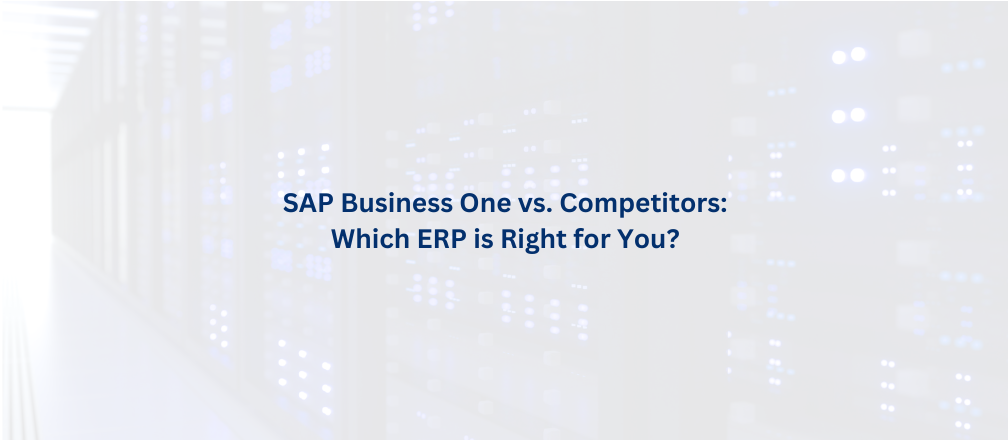Introduction
In today’s fast-paced business landscape, choosing the right Enterprise Resource Planning (ERP) system is crucial for success. Two popular options in the market are SAP Business One and its competitors. This article will comprehensively compare SAP Business One with its rivals to help you make an informed decision. We will explore the features, benefits, and drawbacks of each solution, ensuring you have the knowledge needed to select the ERP system that best suits your organization’s requirements.
Exploring SAP Business One
What is SAP Business One?
SAP Business One is a robust ERP solution designed for small and medium-sized enterprises (SMEs). It offers an integrated approach to managing various business functions, such as finance, sales, inventory, and customer relationships.
Key Features of SAP Business One
SAP Business One boasts an array of features, including:
- User-Friendly Interface: Its intuitive interface makes it accessible to employees with varying levels of technical expertise.
- Scalability: It can grow with your business, accommodating your evolving needs.
- Real-Time Analytics: Provides valuable insights through real-time reporting and analytics.
- Customization: Allows for tailored configurations to match your unique processes.
- Mobile Accessibility: Offers mobile apps for on-the-go access.
Pros of SAP Business One
- Comprehensive Integration: Seamlessly integrates various departments, enhancing collaboration.
- Scalability: Ideal for businesses aiming for growth.
- Robust Reporting: In-depth analytics help in making data-driven decisions.
- Affordability: A cost-effective option for SMEs.
- Global Support: Backed by SAP’s global network for assistance.
Cons of SAP Business One
- Complex Implementation: Setting up SAP Business One can be intricate.
- Initial Cost: The upfront cost can be a challenge for some SMEs.
SAP Business One vs. Competitors
Competitor 1: Oracle NetSuite
Oracle NetSuite is a formidable rival to SAP Business One. Let’s compare the two:
Key Features of Oracle NetSuite
- Cloud-Based: NetSuite offers cloud-based solutions, providing flexibility and accessibility.
- Global Reach: Suitable for international operations with support for multiple languages and currencies.
- Industry-Specific Solutions: Tailored versions are available for different industries.
- E-Commerce Integration: Ideal for businesses with an online presence.
Pros of Oracle NetSuite
- Cloud Advantage: Offers easy access from anywhere with an internet connection.
- Scalability: Adapts to your business’s growth.
- Industry Focus: Industry-specific solutions cater to specialized needs.
- E-Commerce Integration: Ideal for online businesses.
Cons of Oracle NetSuite
- Costly: Can be expensive, especially for small businesses.
- Complexity: Implementation may require significant time and effort.
Competitor 2: Microsoft Dynamics 365
Microsoft Dynamics 365 is another strong contender in the ERP market. Here’s how it compares:
Key Features of Microsoft Dynamics 365
- Seamless Integration: Works well with other Microsoft products like Office 365 and Azure.
- AI-Powered Insights: Utilizes artificial intelligence for predictive analytics.
- Scalable: Adaptable to the needs of growing organizations.
- Flexibility: Offers a range of modules to suit various business functions.
Pros of Microsoft Dynamics 365
- Integration with Microsoft Products: Streamlines processes for businesses already using Microsoft software.
- AI-Powered Insights: Provides valuable data-driven insights.
- Scalability: Grows with your organization.
- Customization: Offers flexibility through various modules.
Cons of Microsoft Dynamics 365
- Cost: Can be expensive, particularly for smaller businesses.
- Complexity: Implementation may require IT expertise.
Also Read:- Enhancing the Efficiency of American Home Appliance
Conclusion
Choosing the right ERP system is a significant decision that can impact your business’s efficiency and growth. SAP Business One, Oracle NetSuite, and Microsoft Dynamics 365 are all powerful options, each with its own set of strengths and weaknesses. By carefully evaluating your business’s needs, budget, and long-term goals, you can make an informed choice that sets your organization on a path to success.
FAQs
What factors should I consider when choosing an ERP system?
When selecting an ERP system, consider factors like your business size, industry, budget, scalability, and integration requirements.
Can SAP Business One handle international operations?
Yes, SAP Business One supports multiple languages and currencies, making it suitable for global operations.
Is Oracle NetSuite suitable for small businesses?
Oracle NetSuite’s pricing can be a hurdle for small businesses, but its scalability and features make it a viable option for those with growth plans.
Does Microsoft Dynamics 365 offer cloud-based solutions?
Yes, Microsoft Dynamics 365 provides cloud-based solutions, ensuring accessibility and flexibility.
How long does it typically take to implement these ERP systems?
The implementation timeline varies depending on the complexity of your business processes and the size of your organization. It can range from several weeks to several months.
Are there any hidden costs associated with these ERP systems?
It’s essential to consider additional costs like customization, training, and ongoing support when budgeting for ERP implementation.

